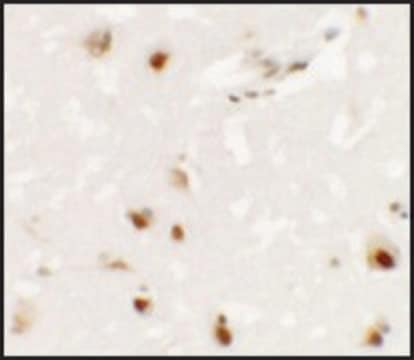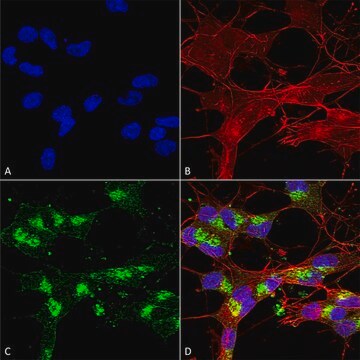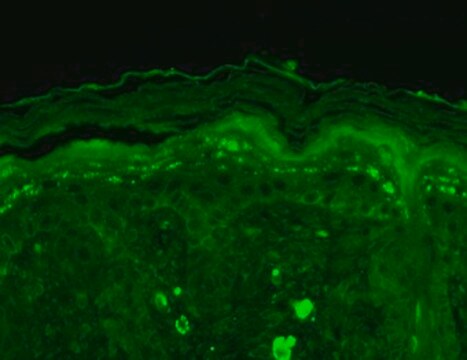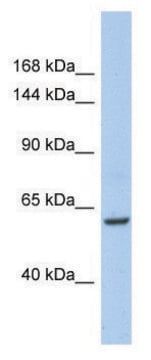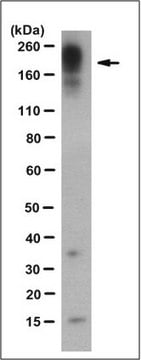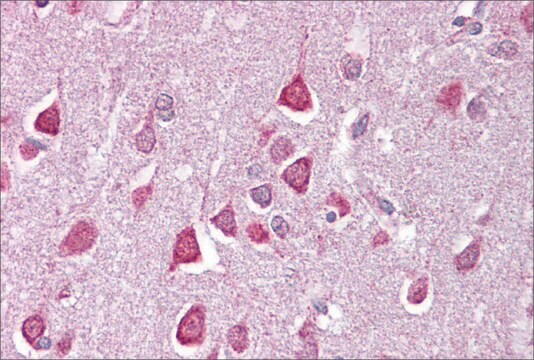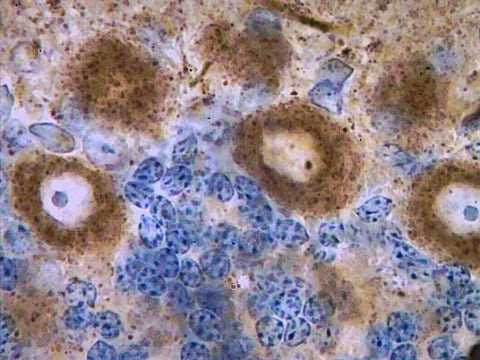HPA003446
Anti-SHANK3 antibody produced in rabbit
Prestige Antibodies® Powered by Atlas Antibodies, affinity isolated antibody, buffered aqueous glycerol solution
Szinonimák:
Anti-Fragment, Anti-ProSAP2, Anti-Proline-rich synapse-associated protein 2, Anti-SH3 and multiple ankyrin repeat domains protein 3, Anti-Shank3
About This Item
Javasolt termékek
biológiai forrás
rabbit
Minőségi szint
konjugátum
unconjugated
antitest forma
affinity isolated antibody
antitest terméktípus
primary antibodies
klón
polyclonal
termékcsalád
Prestige Antibodies® Powered by Atlas Antibodies
form
buffered aqueous glycerol solution
faj reaktivitás
human
technika/technikák
immunohistochemistry (formalin-fixed, paraffin-embedded sections): suitable
immunogén szekvencia
PSGSTFIHPLTGKPLDPSSPLALALAARERALASQAPSRSPTPVHSPDADRPGPLFVDVQARDPERGSLASPAFSPRSPAWIPVPARREAEKVPREERKSPEDK
UniProt elérési szám
kiszállítva
wet ice
tárolási hőmérséklet
−20°C
célzott transzláció utáni módosítás
unmodified
Géninformáció
human ... SHANK3(85358)
Immunogen
Alkalmazás
The Human Protein Atlas project can be subdivided into three efforts: Human Tissue Atlas, Cancer Atlas, and Human Cell Atlas. The antibodies that have been generated in support of the Tissue and Cancer Atlas projects have been tested by immunohistochemistry against hundreds of normal and disease tissues and through the recent efforts of the Human Cell Atlas project, many have been characterized by immunofluorescence to map the human proteome not only at the tissue level but now at the subcellular level. These images and the collection of this vast data set can be viewed on the Human Protein Atlas (HPA) site by clicking on the Image Gallery link. We also provide Prestige Antibodies® protocols and other useful information.
Biokémiai/fiziológiai hatások
Tulajdonságok és előnyök
Every Prestige Antibody is tested in the following ways:
- IHC tissue array of 44 normal human tissues and 20 of the most common cancer type tissues.
- Protein array of 364 human recombinant protein fragments.
Kapcsolódás
Fizikai forma
Jogi információk
Jogi nyilatkozat
Nem találja a megfelelő terméket?
Próbálja ki a Termékválasztó eszköz. eszközt
Tárolási osztály kódja
10 - Combustible liquids
WGK
WGK 1
Lobbanási pont (F)
Not applicable
Lobbanási pont (C)
Not applicable
Egyéni védőeszköz
Eyeshields, Gloves, multi-purpose combination respirator cartridge (US)
Analitikai tanúsítványok (COA)
Analitikai tanúsítványok (COA) keresése a termék sarzs-/tételszámának megadásával. A sarzs- és tételszámok a termék címkéjén találhatók, a „Lot” vagy „Batch” szavak után.
Már rendelkezik ezzel a termékkel?
Az Ön által nemrégiben megvásárolt termékekre vonatkozó dokumentumokat a Dokumentumtárban találja.
Tudóscsoportunk valamennyi kutatási területen rendelkezik tapasztalattal, beleértve az élettudományt, az anyagtudományt, a kémiai szintézist, a kromatográfiát, az analitikát és még sok más területet.
Lépjen kapcsolatba a szaktanácsadással